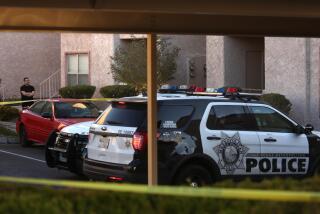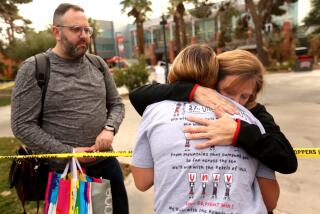Mail Bomb Attack Leaves Yale Computer Scientist in Critical Condition : Explosion: Authorities are investigating to see if there are links to blast that injured California genetics researcher earlier in the week.
NEW HAVEN, Conn. â In the second incident of its kind this week, a mail bomb exploded Thursday and severely injured a noted scientist.
David Gelernter, 38, an associate professor of computer science at Yale University, was in critical condition Thursday evening--with severe injuries to his right hand, right eye and chest--after opening a parcel in his fifth-floor office on the Yale campus.
Law enforcement agencies were investigating to see if there was a possible link to a mail bomb that exploded Tuesday at the San Francisco home of Dr. Charles Epstein, 59, a prominent geneticist at the UC San Francisco.
Epstein, whose research focuses on stroke-induced brain damage, lost several fingers and suffered a broken arm in the blast.
The FBI said the bombings could be related to a dozen other unsolved bombings between 1978 and 1987, some aimed at professors and computer specialists.
FBI Director William S. Sessions, speaking in San Francisco, said the agency would âgo back and look at all bombings of a similar nature,â including the series of mail bombs--dubbed Unibomb, apparently a shorthand for university bombings.
âI donât think itâs illogical for people to suggest that there may be a link,â Sessions said. FBI spokesman Rick Smith said âthere are certain similar characteristics, relating to forensics as well as targets,â that may link the Epstein bombing with Unibomb.
However, Smith said it was too early to determine whether the Yale mail bomb was similar.
In Washington, FBI officials pointed to a 1989 Readerâs Digest article titled âHelp Find This Mad Bomber.â It said that a single bomber had sent or placed 12 devices, killing one man and injuring 21 other people.
The FBI sent a nationwide alert to universities, warning professors to be cautious with their mail and offering suggestions on how to identify suspicious packages. The alert warned about mail marked âConfidentialâ or âSpecial Delivery,â or packages that bear unfamiliar return addresses or illegible handwriting.
Agents from the FBI, the federal Bureau of Alcohol, Tobacco and Firearms and the U.S. Postal Service, as well as local police, were investigating the Yale bombing.
Police dogs were brought in to sniff for explosives, but they were hampered because fire sprinklers had flooded the heavily damaged office, authorities said.
University officials and Gelernterâs colleagues said he is widely known in the computer-science community for writing a computer language called Linda, which makes it possible to link a number of small computers together in order to solve problems that only ultra-expensive supercomputers could tackle a few years ago.
They said they did not believe that Gelernterâs work had any connection with genetics, but that his brother, Joel, an assistant professor of psychiatry at Yale who also is on the staff at the nearby Veterans Administration Medical Center, is the author of research into the connection between genetics and alcoholism.
An anonymous caller to the VA Medical Center at midmorning Thursday said: âYou are next,â according to public affairs director Louise Fitzsimons.
âItâs very puzzling and upsetting,â she said. âThereâs a lot of concern, but we donât know whether it was directed at Dr. Joel Gelernter.â She added that Joel Gelernterâs research is ânot controversial. Itâs aimed at helping humanity.â
Yale and VA Medical Center officials said they did not know if the brothers have collaborated, but David Gelernterâs resume, provided by university officials, indicates that he had worked with members of the departments of anesthesiology, psychiatry and radiology at the Yale Medical School.
The building that houses Yaleâs computer science department turned into a macabre scene Thursday morning. The building was relatively empty and quiet--summer classes had not yet started--when the explosion was heard near the top of the building, followed by a fire alarm.
Rushing down the stairway to escape the building, professors and staff found âlots of blood on the stairs, a bloody shirt and eye glasses,â said Bob Dunne, director of administration for the department.
Officials said that despite his injuries, Gelernter made it down the stairs from his office, went out the back door of the building and through the parking lot to the Yale Health Services clinic, less than a block away.
Dr. Stephen Cohn, chief of trauma services at Yale New Haven Hospital, said Gelernter was speaking when he arrived at the hospital but later was under anesthesia. It was not yet clear whether Gelernter will lose sight in his right eye or what kind of damage his other injuries will cause, Cohn said.
Dunne, who has known Gelernter for seven years, said he was shocked to find that the âvery nice, extremely intelligent guy who was very well-respected in the department and the communityâ had been the target of such a violent act.
New Haven has a reputation as a tough city, and the universityâs buildings are spread out across much of the downtown area, so violence is not unheard of at Yale.
âItâs not safe to walk the streets of New Haven already,â said John Terning, 30, a post-doctoral student in physics. âThis is just weird. Itâs not something that makes me think Yale is any more dangerous than I already know it to be.â
Times staff writers Jenifer Warren in San Francisco and Ron Ostrow in Washington contributed to this story.
More to Read
Sign up for Essential California
The most important California stories and recommendations in your inbox every morning.
You may occasionally receive promotional content from the Los Angeles Times.










